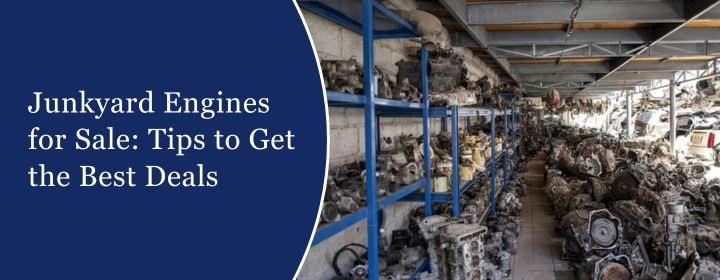
Junkyard Engines for Sale: Tips to Get the Best Deals
Have you ever visited the junkyard and thought that the perfect fit for your vehicle is lying in this junkyard, which will help you run your vehicle efficiently? If your answer is yes, congratulations. Because you are at the right place. In this blog specify certain tips to get your engine from junk.
But here’s the catch – not every deal is a good one. Finding quality junkyard engines takes a bit of patience, a sharp eye, and some know-how.
Over time, we’ve learned a few things – sometimes the hard way – that can help you spot a gem instead of ending up with a piece that barely makes it home.
Understanding Junkyard Engines
Let’s start simple.
Junkyard engines are motors pulled from vehicles that have been scrapped, wrecked, or retired for one reason or another. A lot of people think “junkyard” means “junk,” but this is not true. Because, majority of these engines still have plenty of life left in them.
Some cars get damaged in an accident, but the point is that only their upper body is damaged. Whereas the inner parts are safe and can be reused in other vehicles.
At carmotiveparts.com, we’ve seen engines from low-mileage cars that looked rough outside but ran smoother than expected. That’s the trick – looking beyond the surface.
Why Buy from a Junkyard in the First Place?
The most important reason is cost, because the new engines are costly. But junkyard engines? They’re often half or even a third of what you’d pay elsewhere. And sometimes you can find rare or discontinued engines that you won’t find anywhere else.
Another thing – you’re recycling. So, you are giving another life to something that was otherwise discarded. So, apart from saving money, you are saving the environment as well.
Apart from this, there is some sense of satisfaction when you are in a position to run your old engine again. You’re literally reviving something forgotten. It’s mechanical therapy in a way.
Know What You Need Before You Go
This sounds obvious, but we can’t stress it enough – do your homework. Bring your VIN, engine code, and all the details. Don’t just show up saying, “I need an engine for a Honda Civic.” You’d be surprised how many different engine variants exist for the same model.
We’ve seen people walk out with engines that don’t fit their transmission, or that require extra wiring or mounts to make them work. Avoid that headache by double-checking compatibility.
Also, check if the junkyard offers engines already pulled and tested. Reputable ones – like the ones we work with at carmotiveparts.com – usually test compression and check for leaks before selling. That way, you’re not just guessing based on appearances.
Inspect Before You Buy
This is where you get your hands dirty. Don’t only inspect junkyard engines’ exteriors. Important items to remember are:
- Make that the crankshaft moves smoothly without grinding or stiffness.
- Milky oil cap residue may signal a blown head gasket or other issues.
- Sparks tell stories. Grease- or black-colored plugs may not burn properly.
- Use a flashlight to view the intake manifold or cylinders if the situation allows. Clean internals or regular wear may indicate engine health.
Enquire About Mileage and Vehicle History
Not all junkyards keep extensive records. Certain inquiries must be asked before buying anything. Was this engine from a low-mileage car? Was it wrecked in an accident? Have the seals and gaskets dried up after years of sitting, even with minimal mileage?
Condition matters more than miles, but understanding what you have helps. An ancient engine with 60,000 miles and regular maintenance is better than one with 40,000 miles and no maintenance.
Negotiate Smartly
Let’s be honest, junkyards aren’t like regular auto shops. Prices are flexible. In case you come across minor issues or missing components, you should ask for a discount or any exclusive offers that the seller might be offering. Just be polite and informed.
We’ve gotten great deals this way. Point out what needs replacing (like sensors, mounts, or hoses) and use that as leverage. But don’t lowball so hard that you lose credibility – a good relationship with a local junkyard can save you tons down the road.
Don’t Skip the Warranty or Return Policy
Even though it’s a junkyard engine, check if there’s some form of guarantee – even a short one. Some yards offer 30-day or 60-day start-up warranties. That means if the engine doesn’t perform as promised, you can return or exchange it.
Places like carmotiveparts.com usually offer verified, inspected used engines for sale with reliability checks already done.
Final Checks Ned to Be Done Before Installation
Once you get the engine home, don’t rush the install. Replace all external seals, gaskets, and filters first. It’s cheap insurance. Flush the cooling and fuel systems, too.
We always recommend replacing the timing belt or chain while the engine’s out – it’s so much easier to do now than after installation. And use fresh oil, even if the engine came “ready to run.” You never know what’s been sitting inside.
Final Thoughts
Hunting for junkyard engines isn’t just about saving money – it’s about making smart choices. A little patience, a bit of digging, and some mechanical curiosity can score you an engine that runs great for years. It’s all about where you look and what you look for.
If you’re ready to find tested, verified options without the guesswork, check out carmotiveparts.com. They’ve got a wide selection of quality used engines for sale, sourced and inspected carefully before being listed. Because getting the best deal isn’t just about paying less – it’s about getting real value that keeps your car running strong.